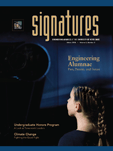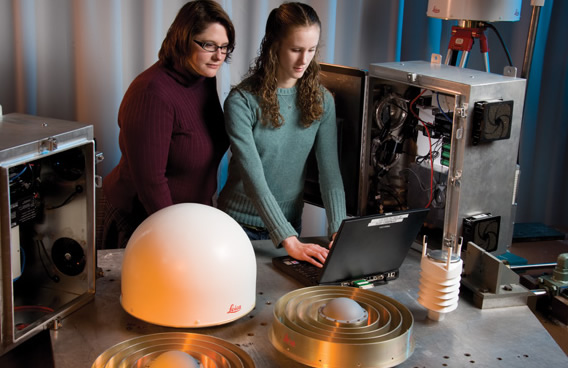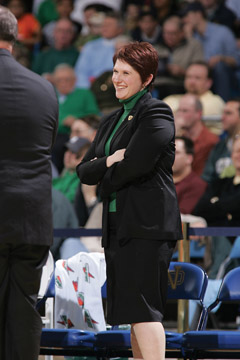
 |
 |
|
 |
Under the direction of
Tracy Kijewski-Correa, left, the DYNAMO Laboratory serves |
||
Go for ThreeIf a category on ESPN’s “Stump the Schwab” game
show were words or phrases associated with “3” or “triple,” then
Tracy Kijewski-Correa, the Rooney Family Assistant Professor of Civil
Engineering and Geological Sciences, could be an answer ... along
with “hat trick,” “triple play,” and “three ball.” With her three degrees
from the University in civil engineering (B.S. ’97,
M.S. ’00, and Ph.D. ’03), Kijewski-Correa is uniquely
qualified not only to teach undergraduate and graduate students,
but she also knows the University very well. She knows what it takes
to be successful as a woman in engineering, and she knows the impact
that engineers have in the world. But the path she’s
currently on could have been vastly different. “I knew I wanted to study engineering before I came to Notre
Dame,” she says. “And, I was definitely interested in structural engineering.
My mom worked in downtown Chicago, so as a child, I went and looked
at the skyscrapers and wondered ‘How’d they do that?’” But
Kijewski-Correa had always envisioned getting her degree and going
to Chicago as a designer. She never thought about doing the kind
of research that lays the foundation for designers ... until one
day on her way to the pizza counter. In her junior year, Kijewski-Correa was serving pizzas in the South Dining Hall (her student job). After one of her classes as she was heading to her job, Ahsan Kareem, the Robert M. Moran Professor of Civil Engineering and Geological Sciences (and her future mentor), told her, “That’s a waste of your talent. Would you like to do research for me instead?”
The rest, as they say, is history. Kijewski-Correa believes had it not been for Kareem she definitely would not be teaching and conducting research at Notre Dame today. She probably would not even have earned her doctorate. As far as being a woman engineer, she says, “The only time I really noticed a difference was in my Introduction to Civil Engineering course. The professor gave us a problem to solve, individually at first, then we were to get back into groups. I was done and looked at the guy next to me, who was having problems. He saw I was done, but instead of asking me, a girl, for help, he looked around for another guy. It was subtle, and it didn’t last long.” Kijewski-Correa’s love of sports broke down some of the barriers very quickly. “It got a lot easier when I could talk football with the guys on Monday mornings.” According to Kijewski-Correa, things are a lot different now in the first-year courses. But she believes girls in engineering can still feel intimidated and start to cluster to themselves. That’s a mistake. Integration with the guys, not segregation, is the key. “There are natural differences between men and women, but I see a much better, more collaborative environment now among first-year students than when I was a student.” Much more important than the male-female thing, she believes, is the impact engineers can have. “Engineering is a noble profession, on par with doctors,” she says. “Advancements in engineering give people cleaner water, cleaner air, and safer roadways and bridges. Engineers design tools that detect illnesses and pathogens, and so much more. It really is a life-saving profession that affects people every day. And, it is consistent with the Catholic mission of the University. You can’t ask for a greater calling in life.” |
|||
